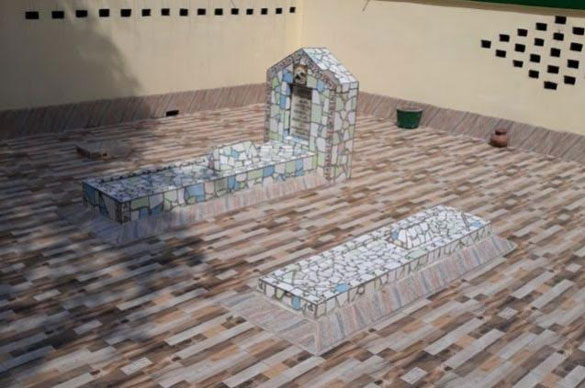Hazrat Sheikh Ziauddin (Jiya): 16th-Century Qadiriyya Sufi Saint And Scholar Of Lucknow, Uttar Pradesh, India

By Sahil Razvi, New Age Islam
28 April 2025
A 16th-century Indian Sufi saint of the Qadiriyya order, Hazrat Sheikh Ziauddin blended scholarship and mysticism. Educated in Gujarat, he authored Islamic commentaries, established a spiritual-academic centre, and remains revered at his Uttar Pradesh Dargah. Legacy endures through disciples and descendants.
Main Points:
1. Born in 1519 in Kasba Niyutini (UP, India); studied under Allama Wajihuddin in Gujarat, mastering exoteric and esoteric Islamic sciences.
2. Initiated into Qadiriya Sufism by Hazrat Sheikh Nizamuddin Shah Bhikari; mentored by Hazrat Sheikh Muhammad bin Yusuf; 40-day spiritual retreat with Hazrat Khizr (AS).
3. Authored commentaries on classical texts (Tafsir Al-Baydawi); blended Sufi piety with jurisprudential scholarship; visionary encounter with Prophet Muhammad (PBUH) in Medina.
4. Four sons perpetuated his work; disciples like Sheikh Jamalul Auliya spread his teachings.
5. Died in 1581; annual Urs at his Unnao dargah; hailed as sahib-e-tahqeeq (truth-seeker) by Mughal historians.
-----

Hazrat Sheikh Ziauddin, popularly known as Hazrat Sheikh Jiya (925–989 Hijri/1519–1581 CE), was a revered Sufi saint, Islamic scholar, and spiritual guide of the Qadiriya Razviya Sufi order. Born in Kasba Niyutini, Lucknow district, Uttar Pradesh, India, his life and teachings left an indelible mark on the spiritual and intellectual landscape of medieval India. This article examines his biography, scholarly contributions, and enduring legacy.
Hazrat Sheikh Jiya received his early education at home before traveling to Gujarat to pursue advanced Islamic studies under the tutelage of Hazrat Allama Wajihuddin bin Nasrullah Alvi, a prominent scholar of his time. His academic journey in Gujarat was marked by intellectual rigor, and he mastered both exoteric (zahiri) and esoteric (batini) sciences.
Ilteja ae Zinda-Javed Ae Qazi Jiya,
Ae jamal-e-Auliya Yusuf Laqa, Madad Karo!
A pivotal moment during his education was his marriage to his mentor’s daughter. Historical accounts describe how Sheikh Jiya cured her of a severe illness through spiritual means, leading Hazrat Allama Wajihuddin to offer his daughter’s hand in marriage. This union solidified Sheikh Jiya’s ties to Gujarat, where he resided for several years.
Hazrat Sheikh Jiya’s spiritual lineage traces back to the eminent Sufi saint Hazrat Abdul Qadir Gilani (d. 1166 CE), founder of the Qadiriya order. He was initiated into the Qadiriya Razviya tradition by his spiritual guide, Hazrat Sheikh Nizamuddin Shah Bhikari Badshah, a celebrated mystic of Gujarat.
Khanah-e-Dil Ko Ziya De, Rū-E-Iman Ko Jamāl,
Sheh-e-ziya, Maula, Jamal-ul-Auliya Ke Waste!
His intellectual mentors included Hazrat Allama Wajihuddin Alvi, from whom he acquired exoteric sciences (ulum-e-zahiri), and Hazrat Sheikh Muhammad bin Yusuf Karshi Burhanpuri, a scholar of esoteric knowledge (ulum-e-batini). Notably, Hazrat Sheikh Jiya is said to have received divine wisdom through a spiritual encounter with Hazrat Khizr Alaihissalam. Lost in the forests of Ahmedabad, he spent 40 days in Khizr’s company, during which he attained profound spiritual insights.
Hazrat Sheikh Jiya emerged as a prolific scholar and spiritual leader. After performing Hajj and visiting Medina, where he reported a visionary encounter with the Prophet Muhammad (PBUH), he returned to India to establish a center of learning in his hometown. His teachings emphasized Sufism, promoting piety, introspection, and adherence to the Qadiriyya path, as well as Islamic Jurisprudence, disseminated through commentaries on classical texts such as ‘Tafsir Al-Baydawi’ and ‘Sharh Aqaid Taftazani’.
His disciples included 11 select followers, among whom Hazrat Sheikh Jamalul Auliya of Koda Jahanabad is prominently mentioned in historical records.
Hazrat Sheikh Jiya fathered four sons, all of whom carried forward his spiritual and scholarly legacy: Hazrat Muhammad Fuzail, Hazrat Abul Khair, Hazrat Abdul Muqtadir, and Hazrat Muhammad Fazlullah.
Hazrat Sheikh Jiya passed away on 21 Rajab 989 Hijri (1581 CE) in Kasba Nyotini, Unnao district, Uttar Pradesh. His mausoleum there remains a site of pilgrimage and spiritual solace. Annual Urs celebrations commemorate his death anniversary, drawing devotees across India.
Hazrat Abdul Qadir Badayuni (1540–1615), a Mughal-era historian, praised Sheikh Jiya’s mentor, Allama Wajihuddin, in ‘Muntakhab-ut-Tawarikh’, highlighting his scholarly contributions. Similarly, Hazrat Shah Turab Ali Kalandari, in ‘Kishaf-ul-Mutawari’, described Sheikh Jiya as a “Sahib-E-Tahqeeq” (master of truth) and “sahib-e-kashf” (possessor of spiritual unveiling).
Hazrat Sheikh Ziauddin Urf Sheikh Jiya epitomized the synthesis of scholarly rigor and Sufi spirituality in 16th-century India. His legacy endures through his descendants, disciples, and the ongoing reverence for his Dargah. As a beacon of the Qadiriyya order, his life offers insights into the interconnectedness of Islamic scholarship and mysticism in South Asia.
-----
A regular contributor to New Age Islam, Sahil Razvi is a research scholar specialising in Sufism and Islamic History. He is an alumnus of Jamia Millia Islamia.
URl: https://www.newageislam.com/islamic-personalities/hazrat-jiya-16th-century-qadiriyya-sufi/d/135333
New Age Islam, Islam Online, Islamic Website, African Muslim News, Arab World News, South Asia News, Indian Muslim News, World Muslim News, Women in Islam, Islamic Feminism, Arab Women, Women In Arab, Islamophobia in America, Muslim Women in West, Islam Women and Feminism
